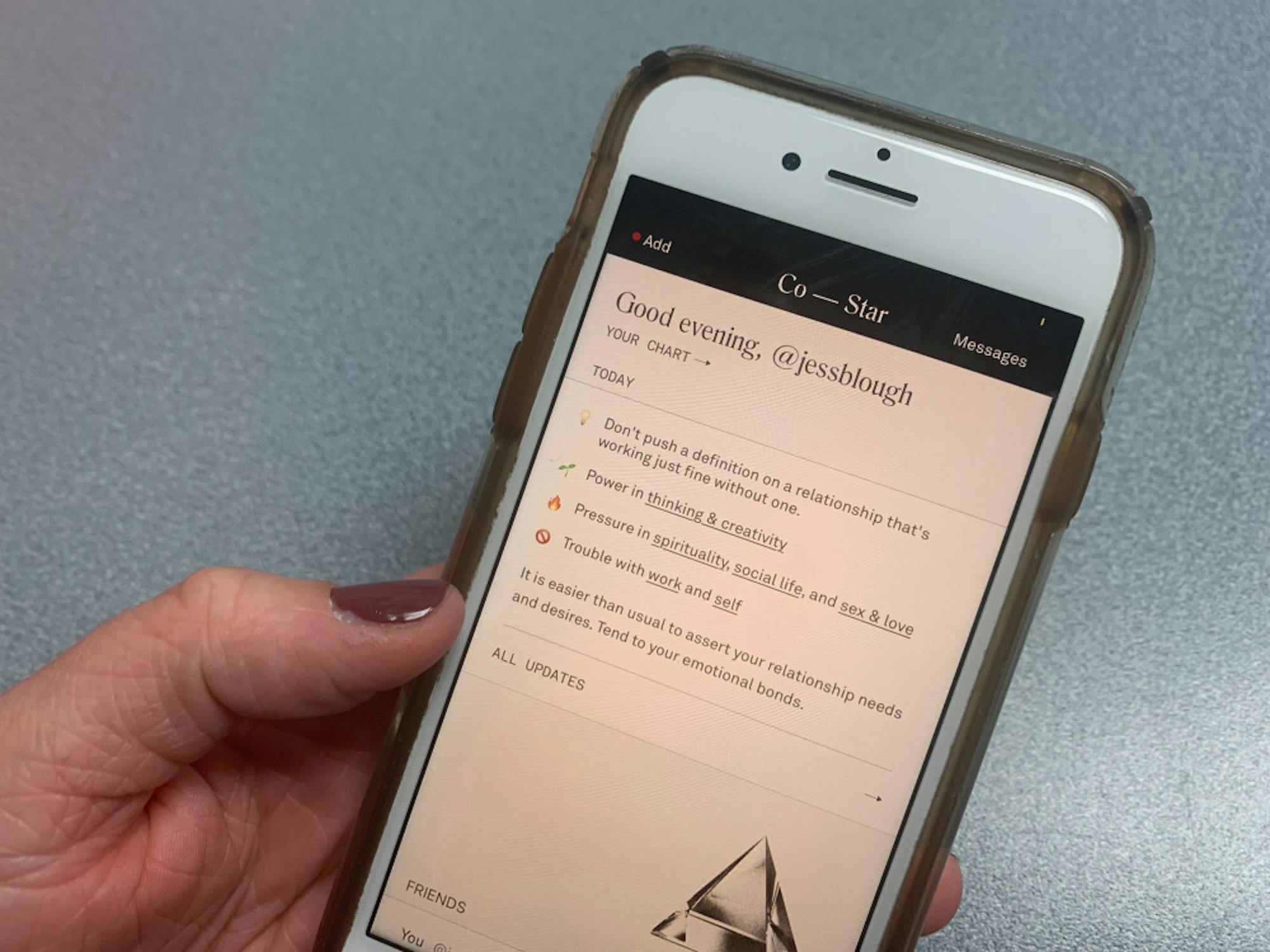“Be hungry for yourself.” / “Your nervous energy won’t be especially useful today.” / “You can be daring without being careless.”
The Co—Star “Your day at a glance” push notifications read as a mix between harsh fortune cookie quotes and life advice from Queer Eye’s Karamo Brown. This minimalist, millennial-forward app promises “hyper-personalized” daily horoscopes powered by artificial intelligence algorithms, satellite data from NASA and traditional astrological practices. Co—Star boasted over 5 million registered accounts as of this summer, with an Apple App Store user rating of 4.9 out of 5.
“These are not your average magazine back-page horoscopes,” the Co—Star description reads.
Co—Star is one of many apps in the recent wave of contemporary astrology, joined by others such as The Pattern, DailyHoroscopeand Astrology & Palmistry Coach. At Tufts, though, Co—Star takes the crown for most popular.
In an online survey of 126 Tufts students, around 42% stated that they have an astrology app — the overwhelming majority of whom cited Co—Star as their app of choice. However, of those who did have an astrology app, nearly half voted that they never use it, compared to about 18% who said that they use the app every day.
Regardless of app ownership or consumption, about 75% of survey respondents reported that astrology has no influence on their daily decisions, with only a handful of votes to indicate the opposite. Despite this trend against the everyday relevance of horoscopes and astrology, some students seemed reluctant to fully swear away the practice.
When asked, “Do you believe that astrology is accurate?" nearly 40% voted "Somewhat." And again, a little less than 40% of respondents found that their star signs "Somewhat" reflected their personality.
Assistant Professor of Religion Jennifer Eyl was not surprised by the uncertainty with which a good portion of Tufts students approach astrology.
“I would suspect that that percentage of the population which is not entirely sure if [astrology is] accurate or if it works, but does it nonetheless, is also a population statistic that we find in all kinds of religions,” Eyl said. “That's an approach that a significant number of people approach religious practices more generally: not entirely positive that it works, but [find that] it’s meaningful to engage in it nonetheless.”
Moreover, astrology has evolved to fit into the 21st century despite originating thousands of years ago. While the Western practice of astrology can be traced back to ancient Babylon, the tradition of interpreting the celestial bodies has always been cross-cultural. Astrology, like religion, initially served a practical, mundane purpose, back when the stars were the only tools to help people navigate the world, Eyl explained.
“Those positions and those events can be read and interpreted so that the questioner can live the most livable life ... They’re about to take a journey by sea, or now by airplane, they marry the right person, or they avoid the wrong person,” Eyl said. “Right, this is very practical information that is supposed to give people a way to flourish and to avoid mishap.”
From abundant zodiac memes to Spotify’s Cosmic Playlists to apps like Co—Star, astrology has remained a recurring topic in pop culture, creating a surge of discussions around the revival of New Age traditions.
In fact, on the eve of Halloween, Tufts University Social Collective (TUSC) hosted a tarot card reader event in the Campus Center. Allison MacKenzie, a daytime coordinator for TUSC, described the event as an overall success.
“I think people really liked getting personalized information about themselves that maybe they might not know, and you know the tarot card readers really fit the bill. They were these two sweet older ladies that really had that knowing aura about them,” MacKenzie, a junior, said.
MacKenzie noted that by the end of the event, the line grew to an extent that they started to read multiple people at once. If plausible, MacKenzie said, TUSC would probably run the event again next year, possibly hiring one more reader for greater efficiency.
Eyl was surprised by the concept of referring to horoscopes for a personalized, individual interpretation of the stars and said she considered such a focus on the “me” as indicative of the current age of "Neoliberalism."
“Typically astrological events and readings are not historically ... about everyone’s uniqueness and everybody's individuality. They are about reading information so that people know how, of course, to navigate the world and to make the right decisions and read information from God that is cryptic,” Eyl said.
For Nicole Setow, a Pisces, her daily horoscope serves as a reminder to reflect inwardly.
“I think what I take from astrology is what I want to. So I don’t use it to figure out what my life is going to be about, but I enjoy looking at Co—Star and being like, that matches up to how I’m feeling today,” Setow, a first-year, said.
Setow also said that she believes people engage with astrology ironically and as a way of hearing other people’s generalizations of each others’ personalities.
“I think people do it jokingly. It’s still one of those things where people enjoy knowing, but it’s not like anyone takes it super seriously,” Setow said.
Co—Star, in particular, embraces this ambiguity, playing into the modern use of astrology as a means for meditation and snippets of life advice, similar to Fitbit’s "Reminders to Move."
“Like much in the astrology world, the messages and meanings are up to you to take as you will,” the Co—Star description reads.
Many survey respondents had similar thoughts, referring to horoscopes as comforting and entertaining.
“I don’t think astrology is accurate in any way, but I do think it can help you think about yourself and your life through a different lens, which is always refreshing and helpful,” one respondent wrote in the survey.
Some students commented that they found the practice, and any credence in it, to be vague and nonsensical.
“I think that it feels arbitrary what [horoscopes] say about who I am or what I am likely to feel. Of course they're going to get some stuff right, but I'm not the same person all the time, and it's easy to write general things,” another student wrote.
Professor of Social Psychology Sam Sommers agreed that, given the lack of specificity innate to astrological interpretations, people could easily perceive themselves in characterizations of their zodiac signs or "prophecies" for their day.
“A lot of the appeal and so called success of astrology comes from confirmation bias. These very general horoscopes and predictions that anyone can see some semblance of truth in," Sommers said. "Anyone can see some grain of truth to the idea that ‘you are in a challenging spot right now, and you like your independence but also working with others.'"
The value that astrology holds among students may lie less in interpreting the convergence of celestial bodies based on one’s birthday as prescriptive fortune-telling, and more about encouraging conscious recognition of one’s challenges and successes at a given moment. Astrology, to some, can serve as a daily dose of spiritual medicine, and a reminder of one’s connection to the intricacies of the cosmos itself.
“The world is an unpredictable and chaotic place,” Sommers said. “We gravitate toward perspectives and world views that help us impose a sense of order and predictability into, onto the social universe.”
Co—Star, astrology influence the lives of Tufts students






